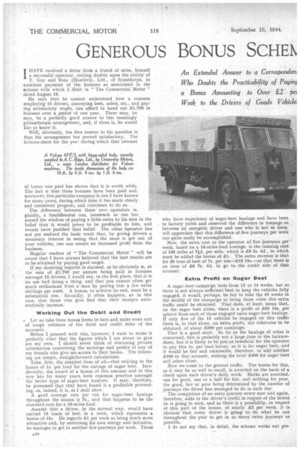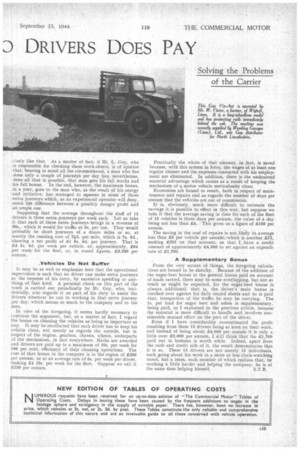GENEROUS BONUS SCHEN DRIVERS DOES PAY
Page 20

Page 21

If you've noticed an error in this article please click here to report it so we can fix it.
IHAVE received a letter from a friend of mine, himself a successful operator, casting doubts upon the ability of T. Goy and Sons (Hauliers), Ltd., of Scunthorpe, to continue payment of the bonuses as mentioned in the scheme with which I dealt in " The Commercial Motor" dated August 18.
He says that he cannot understand how a concern employing 15 drivers, conveying beet, ashes, etc., and paying satisfactory wages, can afford to hand out £1,700 in bonuses over a period of one year. There may, be says, be a perfectly gocd answer to this seemingly philanthropic arrangement, and, if there is, he would like to know it.
Well, obviously, the first answer to his question is that the arrangement has proved satisfactory. The balance-sheet for the yea,during which that amount
of bonus was paid has shown that it is worth while. The fact is that these bonuses have been paid and, moreover, this particular company is one I have known for many years, during which time it has made steady and consistent progress, and continues to do so. ,
The difference between these two, operators is, plainly, a fundibiental one, inasmuch as one has sensed the wisdom of paying a little extra to his men in the belief that it would prove to be profitable to him, and events have justified that -belief. The other Operator has not yet realized the basic truth that, by giving drivers a monetary interest in seeing that the most is got out of your vehicles, one can ensure an increased profit from the business.
Regular readers of "The Commercial Motor" will be aware that I have always believed that the best results are to be obtained by paying good wages.
If my doubting inquirer is alarmed, as he obviously is, at the sum of £1;700 per annum being paid in bonuses amongst 15 drivers, I would say, in the first place, that it is no use half doing a thing, and that you cannot often get much enthusiasm from a man by paying him a few extra shillings per week. A bonus, to achieve its end, must be a substantial one. Secondly, it often happens, as in this case, that those who give find that their receipts automatically increase.
Working Out the Debit and Credit Let us take these bonus items in turn and make some sort of rough estimate of the debit and credit sides of the accounts.
Before I proceed with this, however, I want to make it perfectly clear that the figures which I am about to give are my own. I should never think of disclosing private information concerning the earnings and profits of any of my friends who give me access to their books. The following are simple, straightforward calculations.
Take, first, the simplest item of all—that relating to the bonus of Is. per load for the cartage of sugar beet. Incidentally, the award of a bonus of this amount and in this way has for many years been common practice amongst the better type of sugar-beet hauliers. It may, therefore, be presumed that they have found it a profitable proceeding, as, indeed, it is, as I shall show.
A good average rate per ton for sugar-beet haulage throughout the season is 7s., and that happens to be the standard rate for a 10-miles haul.
Assume that a driver, in the normal way, would have carried 15 loads of beet in a week, which represents a bonus of 15s. He regards £1 per week as being much mare attractive and, by exercising his own energy and initiative, he manages to get in another five journeys per week. Those who have experience of sugar-beet haulage and have been in factory yards and observed the difference in tonnage as between an energetic driver and one who is not so keen, will appreciate that this difference of five journeys per week can quite easily be accomplished.
Now, the extra cost to the operator of five journeys per week, based on a 10-miles lead average, is the running cost of 100 miles at 74d. per mile, which is £3 2s. 6d., to which must be added the bonus of £1. The extra revenue is that for 30 tons of beet at 75. per ton—£10 10s.—so that there is an item of £6 7s. 6d. to go to the credit side of that account.
Extra Profit on Sugar Beet
A sugar-beet campaign lasts from 12 to 14 weeks, but as there is not always sufficient beet to keep the vehicles fully engaged, it would, perhaps, be fair to take the 10 weeks in the middle of the campaign as being those when this extra traffic could be obtained. That does, at least, mean that, on the sugar beet alone, there is a profit of £63 15s. per vhicle from each of those engaged upon sugar-beet haulage. If only five of the 15 vehicles be engaged on this traffic there is, in that alone, an extra profit, not otherwise to be obtained, of about £300 per campaign.
That is a good start. So far as the haulage of ashes is concerned, this is probably not a large item in the balancesheet, but it is likely to be just as beneficial for the operator to pay this Is. per load bonus, as it is for sugar beet, and it would be fair and reasonable, therefore, to add another £100 to that account, making the total £400 for sugar'beet and ashes alone.
Now•we come to the general traffic. The bonus for this, as it may be as well to recall, is awarded on the basis of a check upon each driver's daily work. Marks are awarded,. one for good, one or a half for fair, and nothing for poor, the good, fair or poor being determined by the number of journeys the driver has managed to do in each day.
The completion of an extra journey every now and again, therefore, adds to the driver's credit in respect of the bonus he is going to earn, and as there is a possibility, in respect of this part of the bonus, of nearly £2 per week, it is obvious that every driver is going to -do what he can throughout the year to get in as many extra journeys as possible.
I do not say that, in detail, the scheme works out pre
cisely like that. As a matter of fact, if Mr. L. Goy, who is responsible for checking these work-sheets, is of opinion that, bearing in mind all the circumstances, a man who has done only a couple of journeys per day has, nevertheless. done all that is possible, that man gets his full marks and his full bonus. In the end, however, the maximum bonus, in a year, goes to the man who, as the result of his energy and initiative, has managed to squeeze in some of those extra journeys which, as no experienced operator will deny, mean the difference between a possibly meagre profit and an ample one.
Supposing that the average throughout the staff of 15 drivers is three extra journeys per week each. Let us take it that each of these extra journeys brings in a revenue of 36s., which it would for traffic at 6s. per ton. They would probably be short journeys of a dozen miles or so, at merely the running cost of 74d. per mile, which is 7s. 6d., showing a net profit of £1 8s. 6d. per journey. That is £4 5s. 6d. per week per vehicle, or, approximately, £64 per week for the fleet, or, in round figures, £3,330 per annum.
.Vehicles Do Not Suffer
It may be as well to emphasize here that the operational supervision is such that no driver can make extra journeys at the expense of his lorry, by excessive speeding or anything of that kind. A personal check on this part of the work is carried out periodically by Mr. Goy, who, incidentally, a:so regards it as part of his duty to assist the drivers wherever he can in working in that extra journey per day, which means so much to the company and to the men.
In view of the foregoing, it seems hardly necessary to continue the argument, but, as a matter of fact. I regard the bonus on cleaning the vehicles as being as important as any. It may be recollected that each driver has to keep his vehicle clean, not merely as regards the outside, but in respect of the engine, gearbox, chassis, wheels, underparts of the mechanism, in fact everywhere. Marks are awarded and drivers are paid up to a maximum of 10s. per week for 100 per cent, efficiency of their cleaning operations. The cost of that bonus to the company is in the region of £200 per annum, or at an average rate of 6s. per week per driver, making £4 10s. per week for the fleet. Suppose we call it £250 per annum. Practically the whole of that amount, in fact, is saved because, with this system in force, the wages of at least one regular cleaner and the expenses connected with his employment are eliminated. In addition, there is the undoubted material advantage which comes as a result of keeping the mechanism of a motor vehicle meticulously clean.
Economies are bound to result, both in respect of maintenance and repairs and as regards the number of days per annum that the vehicles are out of commission.
It is, obviously, much more difficult to estimate the savings it is possible to effect in this way, but suppose we take it that the average saving in time for each of the fleet of 15 vehicles is three days per annum, the value of a day being not less than £4. This gives us a figure of £180 per annum.
The saving in the cost of repairs is not likely to average Jess than £5 per vehicle per annum, which is another £75, making £255 on that account, so that I have a credit amount of approximately £4,000 to set against an expenditure of £1,700.
A Supplementary Bonus From the very nature of things, the foregoing calculations are bound to be sketchy. Because of the addition of the sugar-beet bonus to the general bonus paid on account of loads carried, there may be some overlapping, but not so much as might be expected, for the sugar-beet bonus is always additional, that is, the driver's main bonus is checked over against his daily record sheets and he is paid that, irrespective of the traffic he may be carrying. The Is. per load for sugar beet and ashes is supplementary, being paid, as I explained in the previous article, because the material is more difficult to handle and involves considerable manual effort on the part of the driver.
Even if I have considerably overestimated the profit resulting from these IS drivers being so keen on their work, and instead of being about £4,000 per annum it is only a little over £2,000 per annum, I still think that the £1,700 paid out in bonuses is worth while. Indeed, apart from the cash and credit side of it, the result demonstrates that it is so. These 15 drivers are not merely 15 individuals, each going about his work in a more or less clock-watching mood, but a team, each member of which realizes that, by working a little harder and helping the company, he is at the same time helping himself. S.T.R.




















































